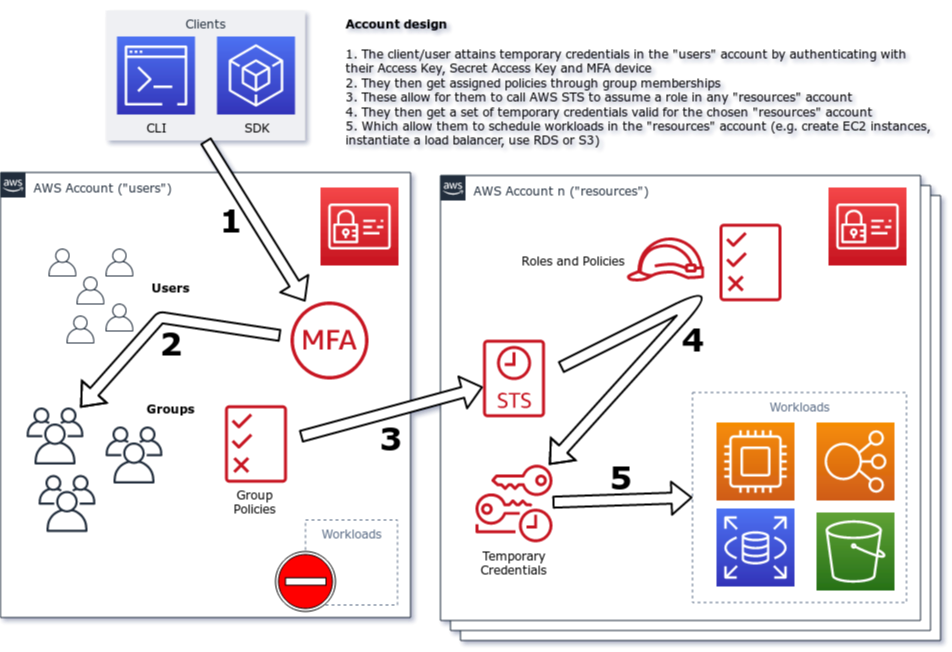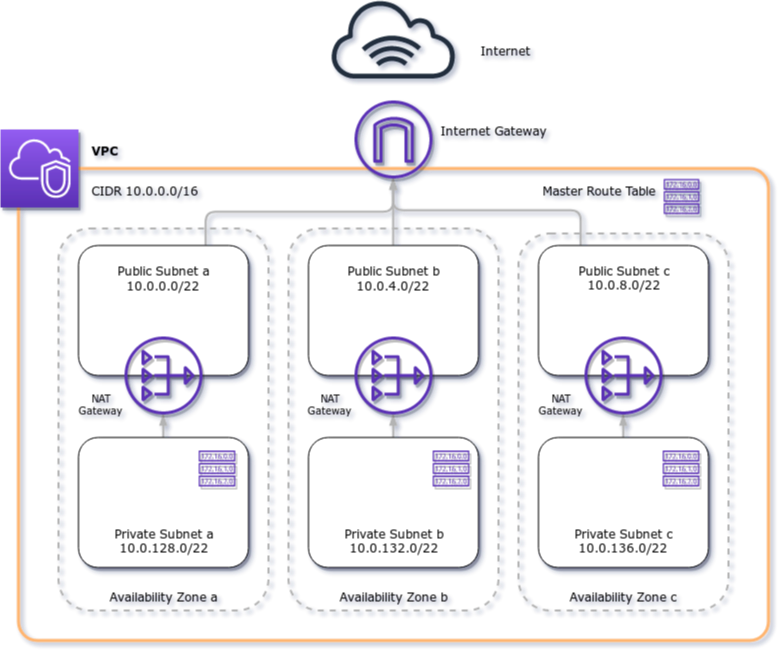This is a comprehensive toolkit for provisioning AWS accounts for a couple of common scenarios in a secure way, with best practices applied by default. The kickstarter is using a set of modules which are consistently tested and developed in an ongoing fashion.
The following tools are required:
- Terraform (>= 0.12.6)
- awscli (>= 1.15.49)
- Any device (e.g. a NitroKey or YubiKey) and/or app (for either Android or iOS) that supports 2FA/TOTP.
Note: Although AWS now supports the modern FIDO2 procotol for adding a second factor to your account it lacks support for the command line, which renders it an unsuable option for most of what you'd either do with this kickstarter or AWS APIs in general.
While some of the scenarios are (almost) free of charge (iam_one_account, iam_two_accounts, config), others will cost you money once you have them provisioned. This is especially true for the vpc scenario, and therefore, since these include the vpc scenario, also the config_iam_vpc_one_account and config_iam_vpc_two_accounts scenarios. The costs for the most elaborate of the scenarios (config_iam_vpc_two_accounts) is roughly $70/65 EUR per month (and a lot less if you're testing it for a short while).
Note: Any of these scenarios require for you to have at least CLI access to the AWS API, most of them even root level or AdministratorAccess privileges. A way of setting these up is described in the documentation for setting up your initial credentials.
Make it your practice to not only read this README but also the relevant Terraform source code files.
To utilize your provisioned resources you need to configure your AWS CLI properly. The same setup will also work for Terraform, or any other application that's using the AWS SDKs (just make sure to specify the right AWS_PROFILE).
Located in scenarios/iam_one_account.
It defines a single account, where users assume either of two roles, resource-admin if they are a part of the admin group, or resource-user if they are a part of the users group. resource-admin allows for full access to the account, including IAM and Organizations. resource-user allows access to any other service except IAM and Organizations. Use these privileges wisely.
The scenario contains two example users, admin and user to given you an idea of how you can create users along with using the modules.
To assume either of these roles, either use the Web Console to assume a role ( > Switch role) or through the AWS CLI. The relevant snippet for the AWS CLI would look like this:
[profile my_resource_account]
region = <my-region>
role_arn = <arn-for-the-role-of-the-role-to-assume>
source_profile = my_account
mfa_arn = arn:aws:iam::<your-account-id>:mfa/<username>
For more information and possible configuration parameters, please refer to the module documentation for iam-users and iam-resources.
Located in scenarios/iam_two_accounts.
This scenario works quite in the same way (in fact, it's using the exact same combination of modules) as the iam_one_account scenario, with an added twist: It provisions two accounts instead of one. You can find an explanation in IAM setup section further down.
You will need to have both AWS accounts created already and have followed the guidelines as to create root level Access Keys for these accounts and save them under separate profiles (e.g. users_account and resource_account). You will need these two profile names, along with the AWS account IDs for both accounts, to run the module.
The scenario contains two example users, admin and user to given you an idea of how you can create users along with using the modules. They will be able to assume roles in the "resource" account afterwards.
For more information and possible configuration parameters, please refer to the module documentation for iam-users and iam-resources.
Located in scenarios/config.
For an explanation of AWS Config please refer to AWS Config for auditing (and enforcement) purposes. For a list of configurable rules and remediations refer to the module documentation for AWS Config.
The module (and therefore the kickstarter) is still missing support for the following AWS Config functionalities: reporting via SNS, centralized aggregation of findings, remediations.
You will need to specify a bucket_prefix for the S3 bucket AWS Config is delivering its findings to, as well as a boolean which decides whether or not you want to enable S3 lifecycle management on the bucket (enable_lifecycle_management_for_s3). You will want to set this to true for a "production-grade" deployment, but leave it as false for testing purposes (which is why the example scenario is using false).
For more information and possible configuration parameters, please refer to the module documentation for config.
Located in scenarios/vpc.
For a deep dive into the VPC setup this scenario is creating please refer to the VPC network design section below. Generally, what you will want is to specify a few tags which allow for resource attribution within your account (e.g. billing purposes) using the tags variable. In this example, tags is set to:
{
Resource = "my_cost_center"
}but it can be any number of tags you want to add to your resources.
For more information and possible configuration parameters, please refer to the module documentation for vpc.
Located in scenarios/config_iam_vpc_one_account.
This is essentially a combination of the scenarios iam_one_account, config and vpc, all configured in one account.
Located in scenarios/config_iam_vpc_two_accounts.
This is a combination of all available core modules, provisioned into more than one account. This is about as secure and modeled after best practices as it can get. If you have more than one account, use this scenario to kickstart your efforts, otherwise use the iam_one_account alternative.
cloudtrail: Enables and configures AWS CloudTrail for logging and auditing purposes.state-bucket: Provisions and configures a S3 bucket for storing Terraform state.
The kickstarter is using the paradigm of a MFA-enabled account assumption model, whereas users aren't granted permissions directly for their users, but rather will have to [assume certain roles] in order to carry out activities (e.g. starting workloads, creating resources, saving files etc.). They can do this either in the web console, or, preferably, using the API (e.g. through this kickstarter using Terraform).
The VPC setup you're getting with this kickstarter is a classic DMZ-model, whereas resources are never directly exposed to the public Internet but are rather living in their separate zone, segregated from other publicly accessible resources. Ideally, those are only load balancers or edge endpoints, but never actual instances or functions with compute workloads.
AWS Config is an integral service for achieving compliance and assurance on AWS. With it, you're able to define guardrails and boundaries by which the account needs to adhere to be "compliant" and even define "remediations" (such as instance shutdowns, revoking credentials or blocking access to certain parts of the account).

